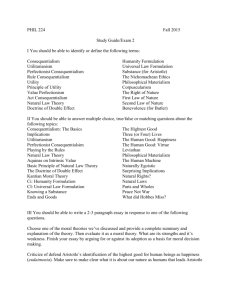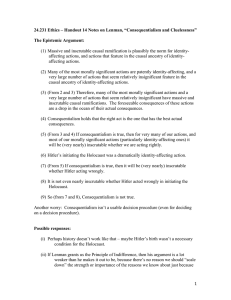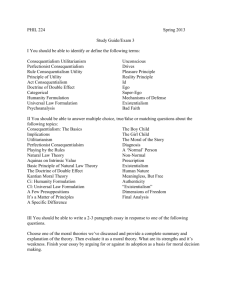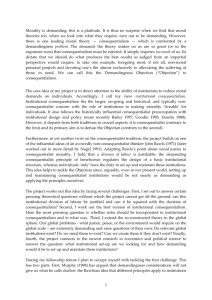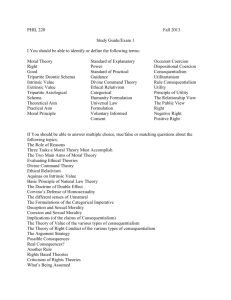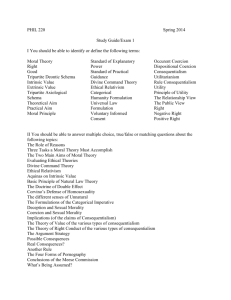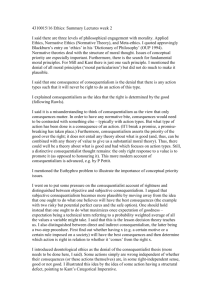Consequentialism
advertisement
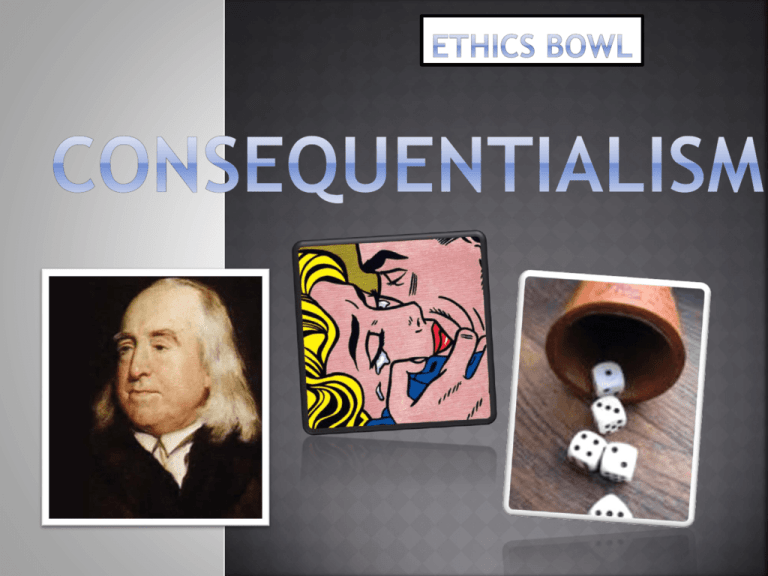
You are on a boat, from which 3 people have fallen off. You only have time to save one of them. The people are: a world-famous brain surgeon, UN Secretary General Ban Ki-Moon, and your own mum. COULD YOU LET YOUR MUM DIE?? SHOULD YOU?? ETHICS = Using reason and argument to work out what to do – and what is good, bad, right and wrong. Not the same as: Tradition Law Religion What time most people do, most of the A lot of people disagree about ethical claims – but this disagreement does not mean that it’s all a matter of personal taste and there are no objective truths!! Moral Relativism (the view that right and wrong are relative to a particular culture or individual) is a view that must be argued for. “Every day will allow you – will invite you – to add something to the pleasure of others, or to reduce something of their pains.” Jeremy Bentham “Bad men need nothing more to achieve their ends, than that good men should look on and do nothing.” John Stuart Mill Consequentialism is the view that it is the consequences (effects) of an action that make the action good or bad. Both short- and long-term consequences count. No actions are good or bad in themselves. It is the effect of what we do on other people that matters. For traditional forms of consequentialism, the goodness or badness of an action is measured in terms of how much pleasure and pain it causes in the people affected. Consequentialism is the idea that “the ends justify the means”. If the end result (consequences) of an action are good, this justifies the means (action) that we took to achieve the end. In any decision, we should take each of our options and weigh up the good and bad effects that will result. The right action is the one that leads to the best balance of good over bad consequences. PERSON ACTION END VIRTUE ETHICS CONSEQUENTIALISM IT IS THE STATE A PERSON IS IN WHEN PERFORMING AN ACTION THAT MATTERS THE END RESULT DETERMINES THE RIGHTNESS OR WRONGNESS KANTIAN ETHICS SOME ACTS ARE RIGHT OR WRONG IN THEMSELVES (DUTY) 1. Think of as many wrong actions as you can (e.g., murder) and as many right actions as you can (e.g., giving to charity). 2. For each wrong action, see if you can think of some circumstances when it would actually be the right thing to do. Do the opposite for the right actions. 3. Can you think of any actions that are always right or always wrong? Consequentialism was made popular in the 1700s and 1800s by Jeremy Bentham. He lived at a time of great political and social change, and he wanted to create a moral theory that treated people equally without depending on religion. Bentham’s theory is that the right action in any situation is the one that leads to “THE GREATEST GOOD FOR THE GREATEST NUMBER”. Bentham believed that only pleasure is good in itself, and only pain is bad in itself. All human beings are ultimately motivated to pursue pleasure and to avoid pain. But we cannot put our own pleasure above those of other people – we must treat everyone equally and impartially. So, to decide what to do we should weigh up the total amounts of pleasure and pain that could result from our actions. You can be a consequentialist – thinking that the right action is the one that leads to the greatest good for the greatest number – without thinking that only pleasure is good. Some consequentialists write lists of things that can be good for people (e.g. health, education, friendship…) Some consequentialists think that the good for each person should depend on the individual preferences of that person. Whatever is good, consequentialism says that the right action is the one that produces the most of that good stuff in the world. Traditional consequentialism says that we need to work out the good and bad effects of each individual action to tell whether it is right. Rule consequentialism recognizes that we do not have time to do this before making every single decision every day!! We should work out a system of RULES for action, which are simple and easy to follow. The right rules are those that will produce the greatest good if everybody follows them. John Stuart Mill developed Bentham’s work. He was a consequentialist, but he thought that more is good for people than just pleasure and pain. Mill thought that a system of rights can be defended on consequentialist grounds – There are certain fundamental freedoms (e.g. free speech) that it will produce the best consequences to secure for everyone. 1. Which rules or rights do you think a Rule Consequentialist would agree with? 2. Choose two rules or rights and try to list as many consequences as you can that would happen if everyone followed the rule all the time. 3. Are some of these bad consequences? How certain are you that the good outweighs the bad? Consequentialism tries to bring about good effects for people – it is concerned with improving human lives. It does not try to derive its authority from some other source (e.g. from God/the law) – instead, it lets us decide whether a law is itself good or bad! You can be a consequentialist as long as you care about people. For consequentialists, each person counts equally in working out which action is right. Consequentialism can be good for the minorities in society whose interests are often forgotten or ignored by powerful people. Consequentialists can give clear and powerful arguments for our duties to help people in poorer countries, to protect animals, and to save the environment. No two situations are the same. It seems like common sense that an action might be right in one situation, but wrong in another. e.g. lying for your own benefit is wrong, but lying to save a life could be right. We need a flexible moral theory that tells us how to work out the right thing to do in a way that depends on the situation. Consequentialism is compatible with any theory of what things are good. You can be like Bentham and think that pleasure is the only good, or you could think that there are lots of goods, or you could let each person decide what is good for him or her. The point is that, once we’ve decided what is good, we have to bring about as much of it as possible for as many people as possible – we can’t be selfish or biased towards our friends. For Bentham, there are no actions that are always wrong – even killing someone might be the right thing to do if it would save hundreds more lives. This sometimes sounds plausible, but sometimes it does not. For example, a violent attack might be right if the attacker gets more pleasure than the victim gets pain! This is the main criticism of Bentham’s theory. Later consequentialists have called this theory a “swine ethic” – meaning that it is fit for pigs, but not for people. Consequentialism requires us to guess what all the consequences of our actions will be, even far into the future. This may be impossible to do. Often, we just do not have enough information to know the likely effects of our own actions. Rule consequentialism is meant to avoid this problem by giving us simple rules to follow. But we still have to break the rules if we know that this will have the best consequences, so we still have to work it out! Consequentialism says that we are just as responsible for a good thing that we could have brought about, but didn’t, as we are for a bad thing that we did. But this means that we are all doing the wrong thing almost all of the time. We could always be doing something else that produces more good for more people – like volunteering for a charity. Surely we are not all morally bad people?? Consequentialism assumes that all the good and bad consequences of an action can be added up and compared with others. But can every kind of good thing be calculated in this mathematical way? Which is more valuable, a piece of ancient Egyptian art or a family photo album? An Ethics Bowl coaching session or a day free from pain in your left foot? Can all goods be measured and compared? Jeremy Bentham came up with seven principles to help us calculate the pleasure and pain resulting from our actions: 1. Intensity – How strong is it? 2. Duration – How long does it last? 3. Certainty – How sure are you that it will happen? 4. Purity – Will it lead to pains? 5. Fecundity – Will it lead to more pleasures? 6. Propinquity – How soon will it happen? 7. Extent – How many people will be affected? Intensity 1 Duration 2 Certainty 3 Purity 4 Fecundity 5 Propinquity 6 Extent 7
